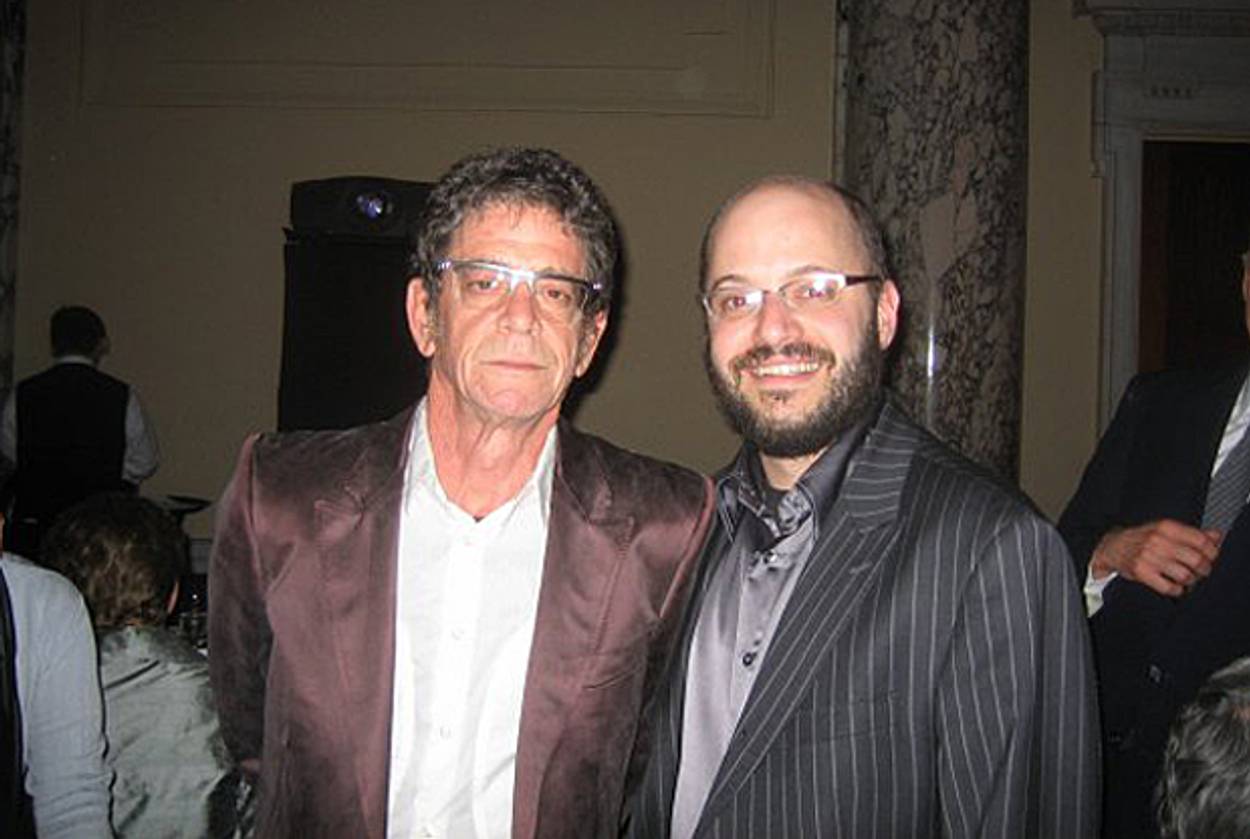Lou’s Gift: The Magic of a Rock ’n’ Roll Poet
An encounter with legendary rock star Lou Reed, who died this weekend at 71




The first thing I knew about Syracuse University was that Lou Reed graduated from there with a BA in English. When I became an English professor at Syracuse, I was on a mission to get him an honorary doctorate. I inherited a mostly dysfunctional desk from his mentor Delmore Schwartz—the dedicatee of “European Son”—and I had a framed cover of The Velvet Underground and Nico on my wall, in the hopes that I could have similarly consequential teacher-student conversations. Even though I had to think twice about whether someone who writes “I’m no blinded Lear, baby” deserves a doctorate, I pressed on.
Although no one followed up on this nomination, in the same year it was announced that the university would endow the Lou Reed/Delmore Schwartz scholarship. Rolling Stone found out about this and asked me to interview him, which I did. He was as evasive as he could be. The peak of the conversation was when he recalled that when Schwartz read aloud from Finnegans Wake, he could understand it. When Reed tried to read it on his own, he couldn’t understand it. You didn’t need to be dyslexic (as Reed was) to be flummoxed by that by that book. I told him there was a recording of Joyce reading it. He asked if it was at the Lincoln Center library, but I explained—entertained by the thought of Reed in the stacks—that it was, in fact, on a commercially available recording called James Joyce Reads.
At that point, the manager, who was listening on the call, announced that I could get only one more question. A colleague of mine, the director of the MFA program in Creative Writing, told me that legend was that when Reed graduated in 1964, there were police waiting for him after he got his degree. He wrote “Heroin” as an undergraduate, but hadn’t tried anything stronger than pot, which is what the cops were there for. When I asked him if this was true, he replied, in deadpan Brooklynese, “I don’t know what you’re talking about.”
“So can I put this to rest then? It’s just a rumor?” I asked.
“How many ways can I tell you? I don’t know what you’re talking about.”
The next day, he spoke at an induction ceremony at the W Hotel at Union Square where he was sitting at a table with David Bowie, Bono, Oscar Hijuelos (also recently deceased), and his wife Laurie Anderson. The first thing he said was, “Yesterday, some guy asked me if I got busted right after I graduated. How could I tell him? It was true.”
Shortly before the ceremony, I picked up James Joyce Reads at St. Mark’s Books. I was introduced to Reed and I handed him the CD. And, wonders of wonders, he smiled, adding, “Bono’s gonna love this.” The picture above was taken right before the smile.
How amazing that I got that man—too cool for almost anything—to exude delight? I wanted to be someone else’s crazy Schwartz—a Humboldt sharing a gift—especially for the next kid as brilliant and misunderstood as Reed. How could I tell Reed how much he meant to me since I first lay down in the dark with a girl listening to the Velvets’ third album shortly after I turned 15? How dare I share how I was transfigured by Berlin, with its misery and bombast, which could belt out sadness as loudly as I could feel it? How could I tell him how Magic and Loss helped me cope with the raw deal of death on a few occasions? I certainly couldn’t tell him how cool he was. He knew that! I could have told him how literary and sensitive he was, but it would have been redundant. I saw the mask go off for just a few seconds, and I saw the wonder of the transfigured literature student—someone who figured out how to distill the Great American Novel into one rock and roll masterpiece after another.
I have since been moved to a new office with a shiny new desk. Schwartz’s broken down furniture will have to inspire someone else now. And we will all now have to figure out a way to live without Reed.
David Yaffe, a professor of English at Syracuse University, is the author of Fascinating Rhythm: Reading Jazz in American Writing and Bob Dylan: Like a Complete Unknown.
Related: Lou Reed’s Rabbi
Previous: Lou Reed, 1942-2013: Baruch Dayan Emet
How Delmore Schwartz Saved My Life
David Yaffe is a professor of humanities at Syracuse University. He is the author, most recently, of Reckless Daughter: A Portrait of Joni Mitchell. Follow his Substack: davidyaffe.substack.com.